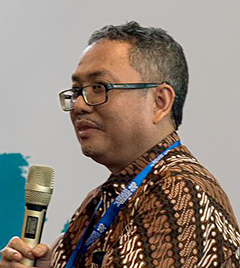Programme and keynote speakers
Programme, biographies and abstracts
Download the conference programme
Download speaker biographies and abstracts
Keynote speakers
Dr Asep Suryahadi

Biography
Dr Asep Suryahadi is the Director of The SMERU Research Institute in Jakarta, Indonesia, since 2009. From 2003 to 2009 he was the Deputy Director of Research at SMERU (Social Monitoring and Early Response Unit). Previously he worked for the Center for Policy and Implementation Studies (CPIS) and the World Bank (both Jakarta). He serves as a member of the Editorial Board of the Bulletin of Indonesian Economic Studies (BIES) and the Advisory Board of the Indonesia Project (both ANU). He has written several articles on the issue of inequality in Indonesia, which can be found on the SMERU website.
In addition, Asep is the author of numerous articles on various development issues in Indonesia published in peer-reviewed journals including Education Economics, Health Economics, Journal of Economic Behavior and Organization, World Development, Journal of Development Economics, and Economic Development and Cultural Change. He holds a doctorate degree in economics from the Australian National University.
Abstract
The Causes and Consequences of Increasing Inequality in Indonesia: A Long-Term View
Measured by consumption per capita, inequality in Indonesia was stable at a relatively low level during the 1980s. It started to increase quickly during the early to mid-1990s, but reversed at the end of the decade due to the Asian Financial Crisis which hit Indonesia quite hard. The recovery from the crisis was immediately followed by a resumption of an upward trend in inequality for two decades. Afterward, inequality was again stable but at a relatively high level. This means that the search for the drivers of increasing inequality should focus on what was going on around the early 1990s. It is most likely that economic deregulation, which took place during the 1980s, caused a tightening of the labor market, which in turn resulted in an increase in wages in the modern sector vis a vis the traditional sector. Experience shows that increasing inequality has serious repercussions on economic growth, poverty reduction, potential for social conflict, crime rates, and so on.
Professor Michele Ford

Biography
Professor Michele Ford is the Director of the Sydney Southeast Asia Centre at the University of Sydney. Michele’s research focuses on Southeast Asian labour movements, labour migration and trade union aid. Michele is the author of From Migrant to Worker: The Global Unions and Labor Migration in Asia (Cornell ILR Press, in press) and Workers and Intellectuals: NGOs, Trade Unions and the Indonesian Labour Movement (NUS/Hawaii/KITLV 2009). She is the editor of Social Activism in Southeast Asia (Routledge 2013) and the co-editor of several volumes including Beyond Oligarchy: Wealth, Power, and Contemporary Indonesian Politics (Cornell SEAP 2014).
In addition to her research work, Michele has engaged in extensive consultancy work for the international labour movement and the Australian government. She is currently a member of the Advisory Boards of the Indonesia Project (ANU), the Asia Research Institute (NUS) and the Global Asia Research Center (NTU).
Abstract
The Politics of Inequality: Opportunities for Engagement at the Local Level
Most scholarly work on Indonesian politics rightly emphasises the ongoing influence of the very wealthy and the politically well-connected in the electoral arena nationally and at the local level. At the same time, however, an increased focus on the ‘local’ as a domain of political contestation, and in particular the introduction of direct district head elections, has created opportunities for grassroots engagement by less privileged groups. Using the example of organised labour, this paper explores the ways that this feature of Indonesia’s electoral system has not only encouraged subaltern participation in formal politics, but also borne fruit in policy terms. The paper argues that trade unions’ engagement in local politics demonstrates that - despite the very real challenges presented by elite influence and money politics - there are nevertheless far greater opportunities for electoral engagement by progressive social movement organisations now than in the past.